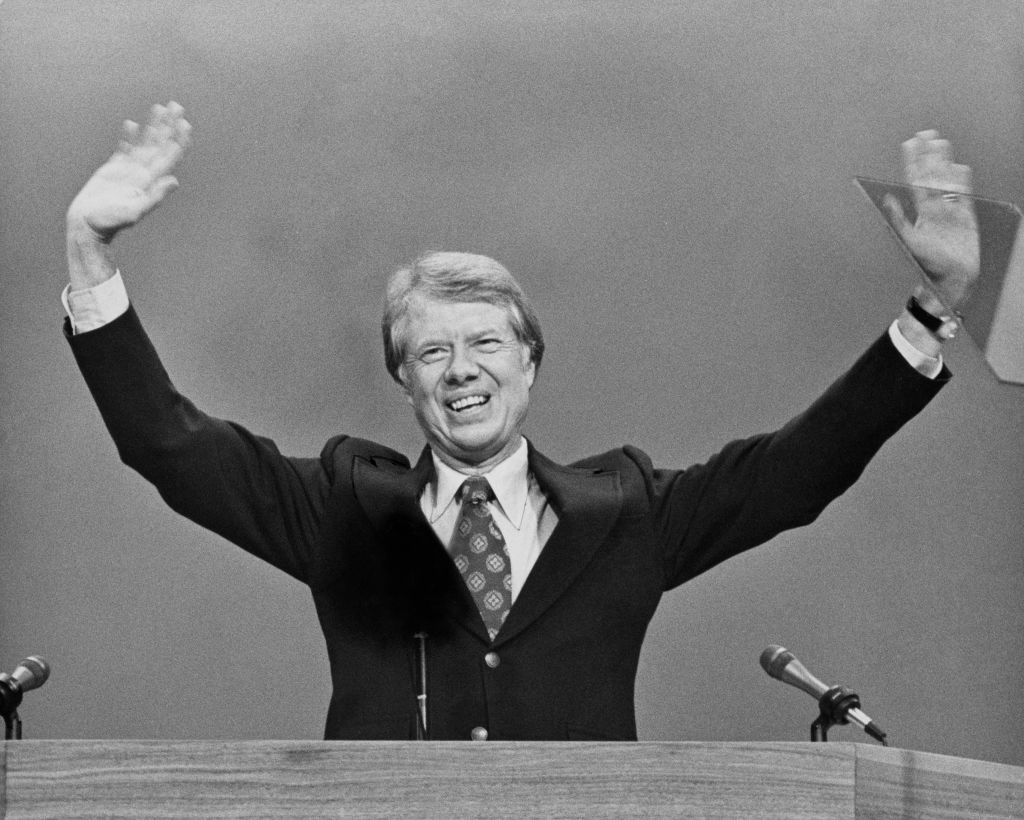
www.dailywire.com
Jimmy Carter’s Unavoidable Legacy
History has an interesting way of softening the hard edges of a past president’s term of office. Time, combined with more information coming to light as well as a more complete verdict re: the long-term impacts, good and bad, of policies will do that. As such, the placement along the scale of best to worst of those who sat in the Oval Office is always shifting.
But 39th President James Earl Carter, Jr., who passed away at age 100, is a presidency difficult to encapsulate. Peruse the media obituaries and a common theme will no doubt emerge. That he was a man of personal character and decency, the “real deal.” Indeed, his will be hailed as “the ideal former-presidency” given his image of skating above politics and keeping his focus on initiatives more beneficial to mankind, whether it be building a house for the poor or monitoring elections abroad. It will be said of him that he lived out his Christian virtues staying faithful to the same woman for 77 years.
But this does not alter the fact that his term in office from 1977 to 1981 was, to put it bluntly, a failure.
From a foreign policy standpoint, Carter attempted to affect statecraft grounded in the promotion of “human rights”. But what many in this country at the time may have seen as noble ambitions, especially coming in the aftermath of Vietnam, was read by enemies abroad as weakness arising from an almost quaint naiveté. This perceived weakness gained validation when in November 1979 anti-American Islamists overthrew the Shah of Iran and stormed the U.S. embassy in Tehran — sovereign U.S. territory as per international law. 52 embassy staff were taken hostage and subsequently held in very public and humiliating captivity for 444 days.
MPI/Getty Images
This affront to our national honor was made ever more acute when six months into the crisis, after fruitless diplomatic overtures, a mission to rescue the captive U.S. citizens resulted in a humiliating failure in the Iranian desert. The mission was scrubbed due to equipment breakdowns and eight servicemen were killed when a helicopter collided with a transport plane during the evacuation. Images of the charred bodies of our dead troops were splashed across headlines around the world, and a somber Carter took to the airwaves to accept responsibility.
The botched raid was not just a shameful blow to our national pride, it underscored a deeper sense that U.S. power was eroding, and that our best days were behind us. The military that once defeated the war machines of Nazi Germany and Imperial Japan couldn’t even get out of its own way in the desert? Maybe we really were in decline? The hostages would languish for all the world to see — and the anti-U.S. forces from Moscow to Beijing to Tehran to gloat over — for another 270 hapless days.
When in 1980 the Soviet Union invaded Afghanistan, Carter’s boycotting the Olympic games in Moscow seemed a tepid, and largely symbolic response that only served to punish our own athletes while not changing Russian actions one iota. Whether or not there was more the Carter administration could have done given the Soviets’ nuclear arsenal is a matter for round tables to discuss. At the time, however, this was viewed as yet another anemic response to flagrant enemy aggression; Americans came to believe we had a lamb in the White House when a lion was needed. And as not-so-clandestine support for the Mujahadeen throughout the Reagan era demonstrated, the U.S. did have more capacity to put the thumb on the scales in the region than Carter seemed willing to do.
The thing about Carter, however, is that not only was he unable, or unwilling to recognize certain bad actors on the world stage, he failed to understand who were the true friends to the U.S. as well. One must consider his double-standard leveled against Israel vis-à-vis the Palestinians. In particular the PLO, which by any impartial definition was a terror organization. And its leader, the vile, murderous kleptocrat Yasser Arafat, a bona fide terrorist. It was the Israelis, however, whom Carter targeted for restrictions and even grotesquely drew an analogy between their efforts to combat terrorism and the growling hounds of Bull Connor. Certainly if the recollections of respected columnist William Safire and former Secretary of State Cyrus Vance are to be believed, Carter was rabidly anti-Israel. For the Israelis, it was very fortunate Carter did not win a second term.
But what about the Camp David Accords? Certainly they were a worthy effort and seem to be among the only such accords between ancient enemies that have survived more or less intact. But, as Jay Nordlinger writes in National Review, Sadat and Begin had already hammered them out prior to inviting Carter in to provide the carapace of legitimacy — and financial support — only the U.S. could offer. It is not a stretch to say that no matter who was president, Camp David would have still occurred.
David Hume Kennerly/Getty Images
At least the Carter presidency promoted the legitimate democratic process, right? Well, it did in that he even went so far as to praise Yasser Arafat’s election. Indeed, Carter was perhaps the PLO chairman’s biggest fan in the halls of the U.S. government. Although as CIA director Jim Woolsey once joked, “Arafat was essentially ’elected’ the same way Stalin was, but not nearly as democratically as Hitler, who at least had actual opponents.”
And, of course, given Carter’s wish to be remembered as the champion of the downtrodden and oppressed (although it depends on who is wearing the jackboots, as Carter seemed to have a look-the-other-way affinity for Marxist dictators whether in Beijing, Havana, or Managua) then it is natural that he would side with the weaker, if morally depraved, Hamas and Hezbollah. As his Bull Connor comparison shows, he would be quite at home today among the throngs of Intifada wannabes on the college campus who view the Arab-Israeli conflict not through the lens of morality but power. In 2014, Carter wrote of Hamas: “Only by recognizing its legitimacy as a political actor—one that represents a substantial portion of the Palestinian people—can the West begin to provide the right incentives for Hamas to lay down its weapons.” Seems a bit optimistic since October 7. Even though the body may change, the intransigent mind of the true believer may remain fixed in place,but this is the disastrous Carter naiveté in the main.
And then there was the economy.
Since the mid-1980s, even with the occasional recession (often of our own making) the U.S. has experienced a sustained economic boom that makes it hard to remember the years leading up to this age of prosperity. But when Carter was in office things were quite different. The middle class especially was hammered with inflation that surged from 6.3% in November 1976 when Carter was elected to a peak of 13.6% in June 1980. Rising interest rates saw 30-year mortgages balloon from 8.8% in November 1976 to briefly touch 18.44% in October 1981, only months into Reagan’s first term. Although there is a lingering misconception that unemployment also soared during the Carter years the data shows this is not the case. In fact, unemployment would not peak until 1983, well into Reagan’s first term. But this could be attributed to Fed policies to crush inflation with exorbitantly high rates leading to a deep recession that had a delayed effect.
I admit that such wonkish analysis gets into the weeds of economics and as the expression goes, “if you lay every economist foot-to-head around the world they couldn’t reach a consensus.” But what is certainly true is that during the Carter years, the “misery index”, economist Arthur Okun’s formula he created in the 1970s to quantify the true impacts of the economy’s performance on the lives of the average American, reached an all-time high of 21.3% in May 1980. (By contrast it currently runs at 7.2%).
As such, the most powerful argument his GOP opponent Ronald Reagan would make during the 1980 presidential campaign was simply to look into the camera and ask the American people: “Are you better off than you were four years ago?” The voters answered and Carter was defeated.
Walter Mondale and Jimmy Carter attend Democratic National Convention on August 14, 1980 at Madison Square Garden in New York City. (Photo by Ron Galella, Ltd./Ron Galella Collection via Getty Images)
The common narrative of Carter’s post-presidential years is that of the farmer who returned to his humble roots in Plains, Georgia, and lived a modest life that all ex-presidents should emulate.
Well, yes and no.
Carter’s work in founding the Carter Center, a non-profit dedicated to the advancement of human rights, as well as his hands-on (literally) involvement building homes for the poor with the Habitat For Humanity project has earned him justified accolades from across the political spectrum. But at the same time he did his share of meddling in U.S. affairs, and sometimes questionably so. While in 1990 George W. Bush was cobbling together his Gulf War coalition, Carter was writing letters to the UN trying to thwart his efforts. Given that his friend Arafat sided with Saddam, one is not surprised. But considering the media’s pouncing on Trump for just weighing in (while a candidate for president no less) on the Democrats’ sham border bill, one can only see a double-standard here. There are other examples but this is the most egregious. One thing is for sure, had Trump engaged in such behavior the word “treason” would be tossed around like a football on Sunday.
And so Jimmy Carter’s story is really one compiled of two narratives. Unfortunately, being a supposedly good man (I never met him ) does not always lead to being a successful president. No man is a saint to his valet, and Carter is no exception. I have no doubt many reading this can offer up less favorable language for him. Who am I to judge? But Carter’s legacy after some five decades in politics from Georgia governor to one-term president, is starting to reveal itself, warts and all. In the end, Jimmy Carter should be remembered for leading a successful life, but a failed presidency.
* * *
Brad Schaeffer is a fund manager and author of three books. His articles have appeared on the pages of Daily Wire, The Wall Street Journal, New York Post, New York Daily News, National Review, The Hill, The Federalist, The Blaze, Breitbart, Zerohedge and other outlets. You can follow him on X and Substack.
The views expressed in this piece are those of the author and do not necessarily represent those of The Daily Wire.














